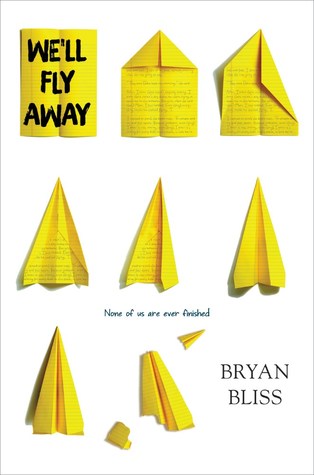I first met Bryan Bliss at the Glen Workshop in 2012, and featured him here and here. His newest book, WE'LL FLY AWAY, debuted on May 8:
Uniquely told through letters from death row and third-person narrative, Bryan Bliss’s hard-hitting third novel expertly unravels the string of events that landed a teenager in jail. Luke feels like he’s been looking after Toby his entire life. He patches Toby up when Toby’s father, a drunk and a petty criminal, beats on him, he gives him a place to stay, and he diffuses the situation at school when wise-cracking Toby inevitably gets into fights. Someday, Luke and Toby will leave this small town, riding the tails of Luke’s wrestling scholarship, and never look back.
But during their senior year, they begin to drift apart. Luke is dealing with his unreliable mother and her new boyfriend. And Toby unwittingly begins to get drawn into his father’s world, and falls for an older woman. All their long-held dreams seem to be unraveling. Tense and emotional, this heartbreaking novel explores family, abuse, sex, love, friendship, and the lengths a person will go to protect the people they love.
You've published three books so far. In what ways do you balance drafting and editing different projects?
Honestly, I’m never working on two books at the same time. I’m fairly monogamous when it comes to writing books. I spend so much time thinking about the characters and the story that it takes up all of the time I have for writing and editing. In the past, whenever I’ve tried to circumvent this slightly annoying process, I come away with half-baked ideas that don’t keep me interested. But the good part is: once I’m all-in on an idea, I know it can be a book.
Sounds like a good approach. In our last interview, when talking about WE'LL FLY AWAY, you said, "It's a book I've been wanting to write for five years, but it never felt like the right time. I just couldn't put any words down on it. But I knew I was going to write it, so it kind of lived in the back of my head like a trapped bird." How did you know it was the right time for this book?
It’s kind of the same answer as the first question! I have a number of ideas that continue to float around in my head, waiting for the moment where everything comes together, and it becomes the idea I’m going to write next. Weirdly, this happens with small details. For We’ll Fly Away, it was realizing that Luke was a wrestler. It was them finding the plane in the first paragraph of the story. Those little moments where I catch a glimpse of who the characters are is supremely important to my writing. Once I know what’s important to them, everything else starts to fall into place rather quickly. Thankfully, it’s already happened with my next book. But I’ll probably keep exactly what that means to myself for a little longer.
I hope we can find out more about that soon! If you could tell your younger writer self one thing, what would it be and why?
Start earlier. While I believe it’s never too late to start writing, I wish somebody would’ve taken me aside and said, “Pursue this. You’re good at it.” Now, if I could magically go back in time I’d probably give myself a few pieces of advice as well. Like, read more. Work harder. And don’t let anyone tell you you’re stupid or that you don’t deserve this. And then I’d look around, make sure whatever genie that had sent me back wasn’t watching, and I’d say, “You’re going to make it. Have fun.”
I wish someone had done that for me too. The tagline on the cover of WE'LL FLY AWAY says, "None of us are ever finished." What significance does this quote have for you?
To say, “none of us are ever finished” is to make a radical statement that, in my mind, is inherently theological. It’s the idea that, no matter what, we have opportunity after opportunity for second chances. We can salvage the pieces of our lives that have been broken. When it comes to the death penalty and the writing of We’ll Fly Away, this was the linchpin that pulled everything together. I wanted readers to see Luke – as well as the actual women and men on death row – as actual human beings who are capable of transformation and growth. People who may have done monstrous things, but don’t have to live the rest of their lives as monsters. Bryan Stevenson, author of Just Mercy, put it best: “Each of us is more than the worst thing we’ve ever done.”
Buy: Bookpassage ~ Amazon.com ~ Barnes & Noble ~ IndieBound
Buy: Bookpassage ~ Amazon.com ~ Barnes & Noble ~ IndieBound
Buy: Bookpassage ~ Amazon.com ~ Barnes & Noble ~ IndieBound
This post can also be viewed here.





No comments:
Post a Comment